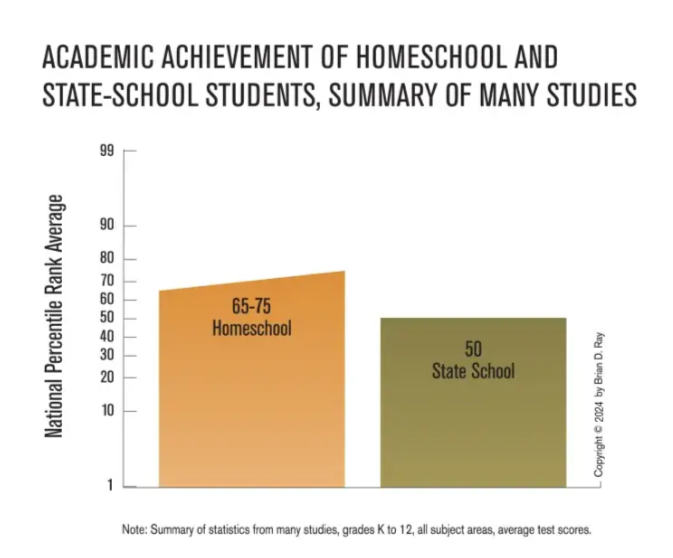Chapter 4 Evaluating Homeschooling Outcomes: A Review of Key Studies Add to Default shortcuts

📖 Rudner 1999
In 1998, Dr. Lawrence M. Rudner conducted a non-randomized study focusing on homeschooled students who utilized Bob Jones University (BJU) curriculum and testing services. While the study reported high academic achievement among these students, Rudner explicitly cautioned against generalizing these results to the broader homeschooling population due to the sample's lack of representativeness. The study primarily reflected outcomes for a specific, privileged subset of homeschoolers and did not account for diverse demographics, including high schoolers, children of color, or those from lower-income families. (Mackinac Center, Coalition for Responsible Home Education)
📊 Ray 2010
Brian D. Ray of the National Home Education Research Institute (NHERI) published a nationwide study in 2010 examining the academic achievement and demographic traits of homeschool students. The study found that homeschooled students scored, on average, 15 to 30 percentile points above public-school students on standardized academic achievement tests. However, critics have noted that the study's sample may have been skewed towards families with higher income and education levels, potentially limiting the generalizability of the findings. (NHERI, NHERI)
🇨🇦 Martin-Chang et al. 2011 (Canada)
A Canadian study by Sandra Martin-Chang and colleagues in 2011 sought to address sampling biases by matching homeschooled children with public school counterparts from similar socioeconomic backgrounds. The study differentiated between "structured" homeschoolers, who followed organized lesson plans, and "unstructured" homeschoolers. Findings indicated that structured homeschoolers outperformed public school students, while unstructured homeschoolers scored lower than both groups. (educacaodomiciliar.fe.unicamp.br, ResearchGate)
📝 SAT Performance: Belfield 2001
Economist Clive Belfield analyzed 2001 SAT data, revealing that homeschooled students had an average score of 1093.1. This was approximately 80.5 points higher than the public school average and 37.5 points above the private religious school average, but 30.7 points below the private independent school average. After adjusting for socioeconomic factors, homeschooled students still scored 38.6 points above expectations, particularly excelling in the verbal section. (Coalition for Responsible Home Education, Unconventional31)
📈 ACT Performance
According to ACT data, homeschooled students consistently outperform their public school peers. From 2001 to 2019, homeschooled students' average ACT composite scores ranged from 22.3 to 22.8, compared to the national average of approximately 21. In 2023, the average ACT score for homeschooled students was 22.8, while the national average was 19.9. (ACT, miningjournal.net)
🧠 Key Takeaways
- Potential for High Achievement: Homeschooling can lead to strong academic outcomes, especially when instruction is structured and resources are adequate.
- Variability Based on Structure: Structured homeschooling approaches tend to yield better academic results compared to unstructured methods.
- Influence of Socioeconomic Factors: Studies often reflect higher achievement among homeschoolers from more affluent and educated families, suggesting that socioeconomic status plays a significant role.
- College Performance: Homeschooled students who attend college generally perform well academically, with some studies indicating higher GPAs compared to their peers from traditional schooling backgrounds.
🔗 Further Resources
For more comprehensive information on homeschooling outcomes, visit the Coalition for Responsible Home Education's research summaries:



